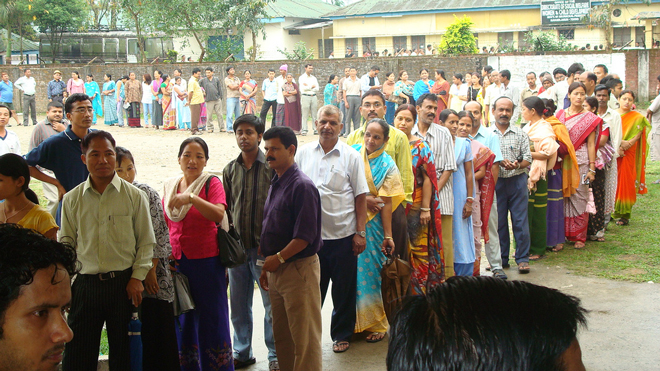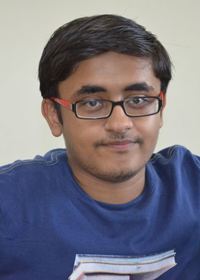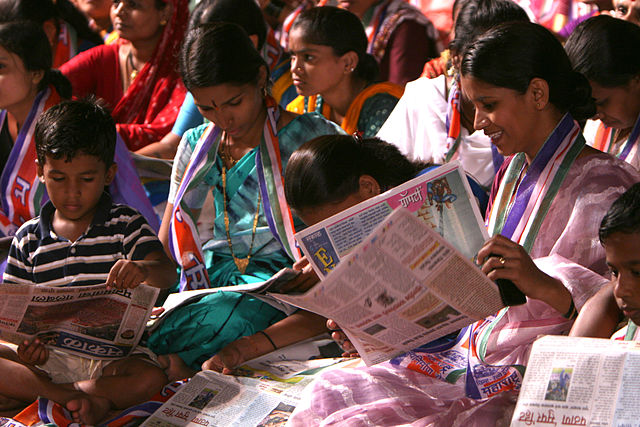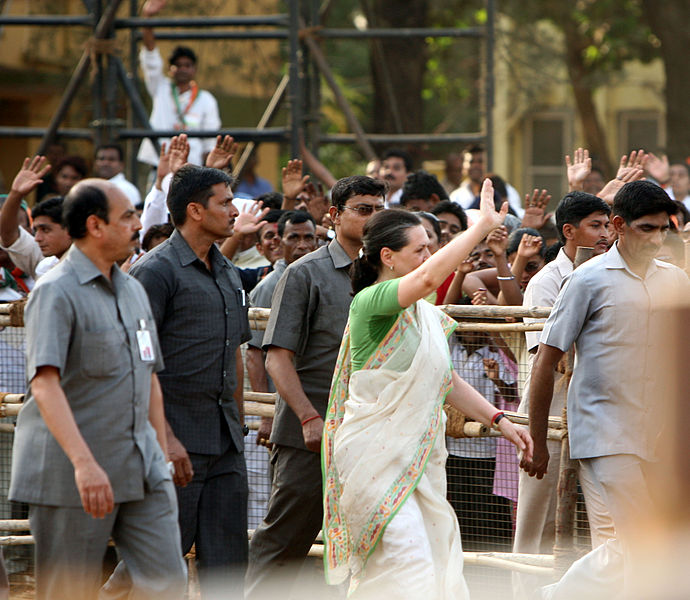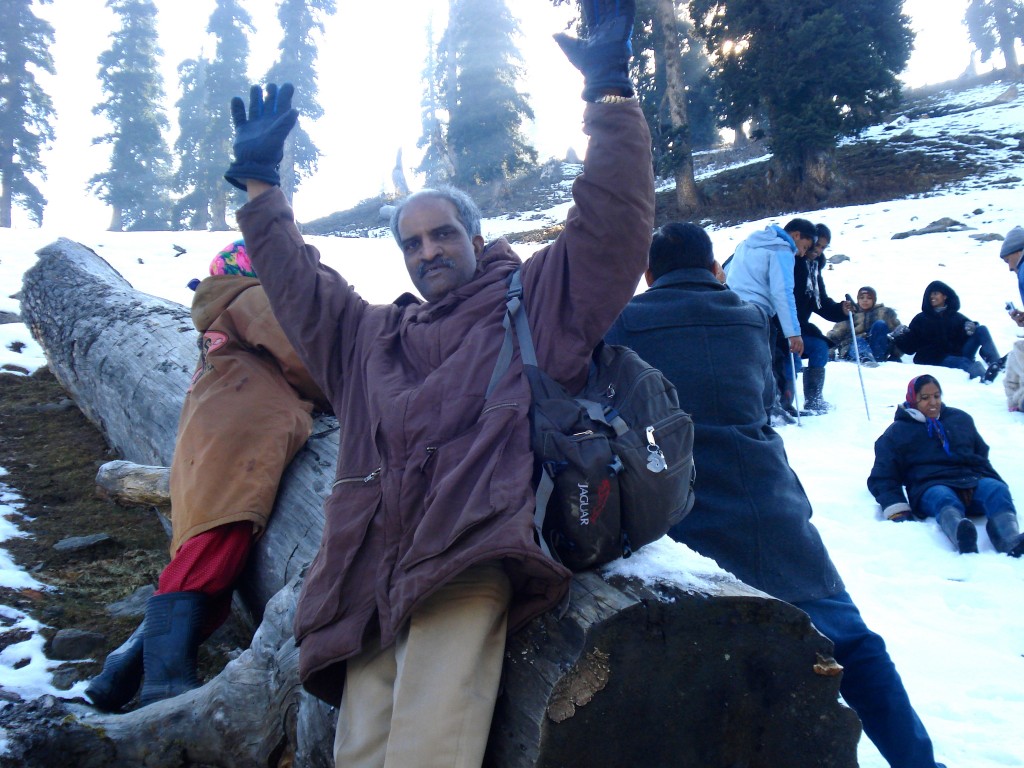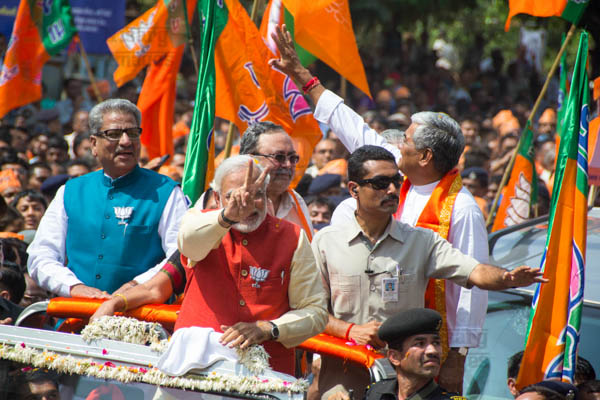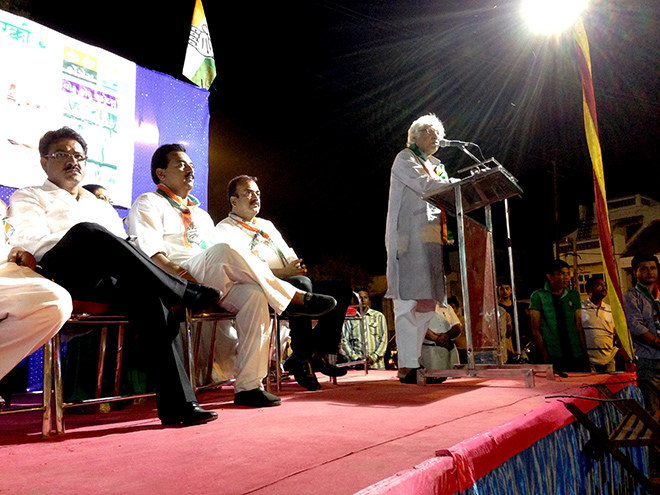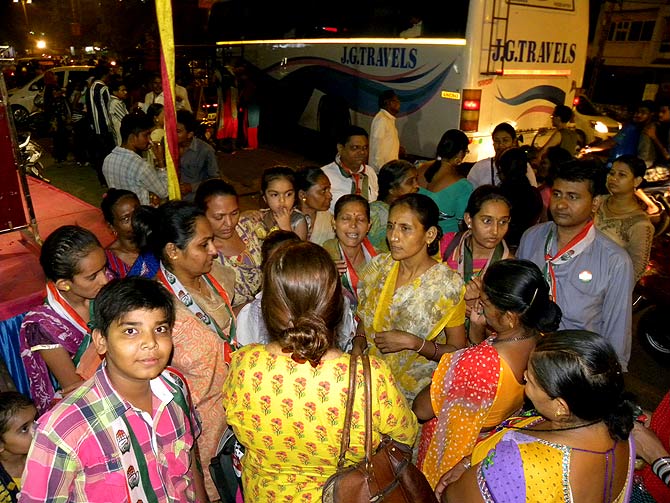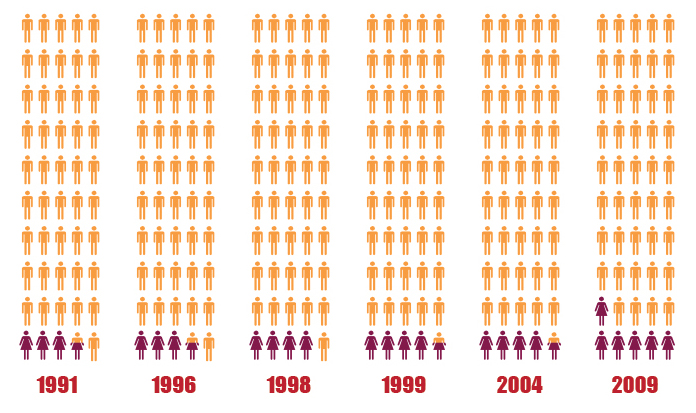The voice of the non-voter: why some 264 million did not queue up
While 66.38 per cent — 551 million — exercised their democratic right across the 190,000 polling booths across India, and 32 of the 35 Indian states and Union Territories saw a higher turnout than in 2009, 33.62 per cent Indians did not vote.
That is 264 million voters — six times the population of UK — who did not get inked.
The top performers in the elections were the smaller states: Nagaland (88.6 per cent turnout), Lakshadweep (86.8 per cent) and Tripura (84.3 per cent). And in Goa, Punjab, Chandigarh and 13 more states and Union Territories, the female turnout was higher than that of males.
As for the most populous states, many performed poorly. In Bihar, 43.5 per cent did not vote. And from among the 200 million voters of Uttar Pradesh, 41.4 per cent did not — or could not — vote.
Project India reporters spoke to voters in several constituencies to get a sense of why they did not cast their votes — and what they would like in future elections. Here’re some voices:
Somipoem Keshing, Manipur: ‘It’s all a big scam’
Indian election is a big scam. Most people are simple-minded and they are easily influenced by politicians hunting for votes. Democracy is a beautiful system, but it is easily twisted by political strategy. Democracy says a government for the people. Unfortunately, that is not what happens. The government is monopolised by the powerful candidates. The rich candidate comes to power again and again. The poor remain poor – again and again. There is a deep contradiction between the real politician and the politician who appears on your TV screen. They are not the same. It’s all a big scam.
Komal Sheth, Pune: ‘An online voting system is the answer’
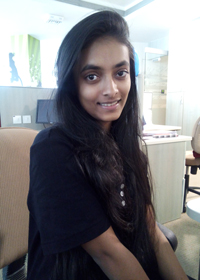 I moved from Kolkata to Pune two years ago. My voter ID was already made in Kolkata and there was no provision for me to transfer the voting constituency to Pune. My hectic college and work schedules didn’t let me travel to vote in my constituency. I had prepared to vote and created my photo ID, but I didn’t get the chance. I feel bad and disappointed. It would have been more satisfactory if there is better provision for people who move due to work or education. An online voting system is definitely an answer, but we still need to figure out how it would work.
I moved from Kolkata to Pune two years ago. My voter ID was already made in Kolkata and there was no provision for me to transfer the voting constituency to Pune. My hectic college and work schedules didn’t let me travel to vote in my constituency. I had prepared to vote and created my photo ID, but I didn’t get the chance. I feel bad and disappointed. It would have been more satisfactory if there is better provision for people who move due to work or education. An online voting system is definitely an answer, but we still need to figure out how it would work.
Hari Gaurav, Chennai: ‘My vote is not going to change anything’
I have completed my BE from a city college. I didn’t vote. I opted not to vote because none of the parties have promised free education for financially poor students. None of the parties have promised to develop the quality of education in India. I prefer to be a non-voter than vote. My vote is not going to change anything.
Eric Kapadia, Mumbai: ‘It didn’t make the slightest difference to my life’
Having lived in Canada for the past two years now, this was the first time I was away during elections. Although I couldn’t come home to vote, it didn’t make the slightest difference to my life. All these politicians only focus on places where they know they will get a large number of votes. Maybe that’s why nobody votes in South Bombay – not because we’re snobs, but because if they don’t seem to care about us, then why should we care about them? But the day a leader rises and has the courage to talk about issues that are swept under the rug in India, that’s a day I would look forward to voting.
Arsilan Lone, Srinagar: ‘I will not betray the martyrs’
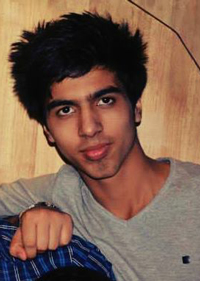 I will never vote for any pro-Indian politician in Kashmir. They are nothing but stooges of New Delhi and just strengthening the brutal occupation by India. I am part of the future of Kashmir and I will not start my life by kissing the hands that are red with the blood of our brothers and sisters. I will not betray the martyrs. It doesn’t matter whether pro-freedom leaders give election boycott call or not, I know my moral responsibility very well. I was born in an occupied nation but my mind and heart have never accepted that.
I will never vote for any pro-Indian politician in Kashmir. They are nothing but stooges of New Delhi and just strengthening the brutal occupation by India. I am part of the future of Kashmir and I will not start my life by kissing the hands that are red with the blood of our brothers and sisters. I will not betray the martyrs. It doesn’t matter whether pro-freedom leaders give election boycott call or not, I know my moral responsibility very well. I was born in an occupied nation but my mind and heart have never accepted that.
Rahul Shah, Mumbai: ‘Why aren’t the roads fixed?’
 If I was interested in politics, I would have voted. Nobody within the political sphere seems to care much about the political good. If I’m not wrong, this is one of the constituencies that gets the largest share of funds. So why aren’t the roads fixed? What is happening to the filth everywhere? Nothing.So what difference would it have made if I voted? I have my voter’s ID and the polling booth was just opposite my house. Still, I chose to go for a holiday.
If I was interested in politics, I would have voted. Nobody within the political sphere seems to care much about the political good. If I’m not wrong, this is one of the constituencies that gets the largest share of funds. So why aren’t the roads fixed? What is happening to the filth everywhere? Nothing.So what difference would it have made if I voted? I have my voter’s ID and the polling booth was just opposite my house. Still, I chose to go for a holiday.
Rishabh Gupta, New Delhi: ‘If only the EC had been more efficient’
I would have voted for first time in this election if the Election Commission had eased out the ways to register for the voter ID card. I had registered myself with all my details on Election Commission’s website but nobody came to verify the details at my home. When I enquired from officials who distribute voter ID cards they told me to visit the regional office but I was not able to visit due to my college. I am very sad that I was not able to vote in this transformative election. I wish I could have voted. If only the election commission had been more efficient.
Nandini (not her real name), Mumbai: ‘I didn’t vote because I don’t want to give them power’
Being an 80-year- old woman, I have been a part of Indian history. I was there when the first general elections took place. I’m not proud of the fact that I didn’t vote, but it doesn’t bother me. Every day there are the same news: One politician says something to another, so the party gets angry. Everyone starts shouting, not allowing other people to speak. Tell me, how am I supposed to take these people seriously? I didn’t vote because I don’t want to give them power. I think the entire concept of elections is beautiful. One citizen giving power to another. But as soon as the power is given, some people then do nothing. Instead, they take my money and build themselves big fancy homes. And this merry-go-round has been happening for years. So if I vote, I will help turn the merry-go-round, reinforcing the cycle. Now that’s something that would bother me.
With inputs from: Zulkarnain Banday, Rachitaa Gupta, Manolakshmi Pandiarajan, Jehan Lalkaka, Anshul Gupta, and Deepa Venkatesan.
Photo: rajkumar1220, Flickr CC
Why India won’t see enough women in Parliament for a long time
“You can tell the condition of a nation by looking at the status of its women.”
—Jawaharlal Nehru, the first Prime Minister of India
“Politicians only address men. We, the women of the village, are told by our husbands which symbol to vote for. We don’t think, we vote.”
— Nirmala Devi from Sarhera village, Haryana, speaking to Project India
It is all over bar the counting. The 2014 Lok Sabha elections are done. Figures available from the Election Commission of India show the total turnout of voters was 66.38 per cent , which means that 551.3 million people stood in line at polling booths all over the country and pressed the button of their choice on electronic voting machines.
By the evening of Friday, May 16, 2014, India will know who will lead its new government at the centre. Or, if the votes are too divided for a clear leader to emerge, have at least an inkling of what to expect over the next five years. Everyone, however politically apathetic they may be, expects change.
But one thing will not change, or at least not by a great extent. And that is the number of women among the elected Members of Parliament in the Lok Sabha, the lower of the two houses of Parliament, literally translated into English as ‘the House of the People’. Come June 1, when the new government begins to function, 543 MPs will occupy seats in the Lok Sabha, but less than a hundred of them will be women.
It’s possible to know this already. Women composed just eight per cent of all the candidates from all the political parties that contested the elections this time. That is, only 632 women ran for election, as opposed to 7,527 men.
In the last Lok Sabha that came into power in 2009, there were 59 women MPs, meaning they occupied about 11 per cent of the seats. To maintain or beat these numbers in the 2014 elections, the women candidates, though wildly outnumbered, need to be more electorally successful than the men.
Is this proportional representation in the world’s largest democracy? Hardly.
You’d imagine that, at least in these elections, there would be more women candidates than ever before. Since the horrific gang rape in New Delhi in December 2012, women’s concerns about safety, sexual insecurity and gender discrimination have been in the media spotlight consistently, leading to discussions, arguments, introspection and a clearer picture of the strongly patriarchal society that is India. The fact that the ruling Congress lost the Assembly elections in New Delhi in 2013 can be partly attributed to the way it behaved after the December 2012 gang rape: these issues are believed to have motivated a good proportion of the female electorate to go out and vote. And women compose half the population of the country. So how come political parties didn’t think it important to nominate and support more women candidates?
This is because women are not seen as winners, according to a study by Dr Carole Spary of the University of York, England. In a paper titled Women Candidates and Party Nomination Trends in India – Evidence from the 2009 General Election, she writes that political parties in India tend to see women as less likely to win elections than men, and therefore prefer not to take risks with seats they could conceivably win. The perception that ‘winnability’ is based on gender is very strong, even though, if you break up the electoral success rate by sexes, the women who do win elections are proportionally far more successful than the men who win, given the huge number of men they have to beat.
The 2009 general election, which made 59 women MPs, was a record-breaker as far as women’s representation was concerned. Before that, women tended to occupy about eight to nine per cent of the Lok Sabha’s seats. But the fact that more women got to Parliament in 2009 did not mean that political parties nominated more women in 2009. It was just that more women beat more men. So it is fairly clear that political parties continue to lack faith in women as winners, which makes it difficult for women to participate in politics at all. Add to this the fact that, compared to men, women are less likely to stand for elections as independent candidates (in the 2009 elections, slightly more than a third of female candidates ran as independents while nearly half the male candidates did the same) for various reasons including a lack of finances for an effective campaign, and you begin to see why there aren’t many more women in the electoral field.
It’s true that India is not the only nation with such a low proportion of women among its popularly elected legislators. In the West, even countries with far longer and deeper traditions of democracy and gender equality are struggling to deal with the same problem. So you could argue that a democracy that is still less than 70 years old is not doing too badly. While the proportion of women in the Lok Sabha was 11 per cent at its best so far, in the US House of Representatives, it was 18.3 per cent, and in the United Kingdom’s House of Commons at this time, it is 22.6 per cent. These proportions remain about the same in the upper houses of India, the USA and the UK’s legislative bodies.Among its neighbours, however, India falls somewhere in the middle of the scale of women’s participation in politics. More than 20 per cent of the lower houses of Pakistan, Nepal and China’s national legislative bodies are women, while only five to six per cent of Myanmar, Bangladesh and Sri Lanka’s national legislative bodies are female.
But comparisons are meaningless — just because one nation does better or worse than another, it does not mean that that nation does not have a problem.
And the problem with women’s participation in politics in India, it could be argued, has much to do with the country’s patriarchal attitude. In 2014, male children are still preferred and though prenatal sex determination was banned in 1996, female foetuses are still aborted in high numbers, and girl children who are born tend to be given poorer care than boys. This attitude is so deeply rooted that according to the 2011 Census, India now has 37 million fewer women than men (586.5 million women to 623.7 million men).
A good indication of how little regard girls tend to get in India is the literacy rate. For men, the literacy rate is 76 per cent, but only 54 per cent of women are literate. This means their opportunities are limited.
All these issues and more have been in the media spotlight since the Delhi gang rape. But even though sexual violence and the state of women’s safety in Delhi was one of the reasons why the ruling Congress was wiped out in the Assembly elections last December, public anger over the lack of safety for women does not seem to have a national resonance yet. Even many women, the victims of patriarchy, seem not to understand the insidiousness of the social system, as India learnt when Asha Mirje, a politician from the National Congress Party and a member of the National Women’s Commission, said at the beginning of this year that the victims of gang rapes might have invited the attacks with their clothes, behaviour and their presence at inappropriate places.
So it seems unlikely that the change that is demanded in these Lok Sabha elections will include much-needed change for women in India.
But what of the future?
In 1947 after Independence, India became a democracy and, unlike many post-colonial states, has managed to stay a democracy so far. So the women of the nation still have hope. And it isn’t a weak hope. The way the public spontaneously mobilised itself against the establishment after the December 2012 gang rape in Delhi; the way the media took up the gang rape case and forced politicians and the establishment to address women’s concerns, show that women’s voices can and will be heard. So in the future, there could be many more women in Parliament.
Having more women in the Lok Sabha would not necessarily eliminate all the issues that the women of India face every day. But it would show half the nation that the other half of the nation is capable of being leaders, politicians and role models.
Photos: Al Jazeera English CC
This story was also published on Rediff.com, our media partner.
“ ”
After 25 years of conducting polls, I finally voted
D Venkatesan, 52, government servant, Pune
What India has just witnessed is the largest electoral exercise seeking change. I could feel the tectonic plates shifting beneath my feet! I am a common man; middle-class, mid-50s, who goes to office at 8 in the morning and returns home by 6pm. I always wanted to be part of the system by at least casting a vote. It was finally possible after 25 years on April 17, 2014, when I voted for the first time.I am a central government employee and work for a water research station in Pune. Every time during elections, the expected routine for those few days would be to complete election duty. I have most of the time been assigned to far-off constituencies. And by the time our duty is over, it is too late to even think of casting our vote. There is something called the postal ballot form that get issued; but technical glitches were such that my vote never reached on time. However, this year, fortunately, I was not assigned any duty! The day I came to know that, I heaved a sigh of relief. Finally, I could vote, that too in the most important election, when my country faces a revolutionary road.
Since the past few months, more than politics, government or even office, media has overpowered our lives. I began to feel that there was a whole new side to choosing the right candidate. I began to feel as though the news channels were indirectly telling me every night at prime time whom to vote for!
The anxiety of being a first-time voter after 25 years was there in me. We have seen corruption, unemployment, and a lot of other issues. Change is something that our country needs. That was a definitive ground for me, to understand and cast my vote to the rightful candidate. There may be politicians who use social media to attract the masses, and there may be others who play the blame-game and expose others. I didn’t let any of the ‘limelight’ influence my vote. My vote was a choice made taking into account each and every one’s work.
When I went up to the polling booth early that morning, I noticed a lot of chaos just a few yards away. There was a huge crowd of people, frantically flipping pages of books, trying to browse through. This was the condition in many other booths, because a lot of people were disappointed to not find their names in the list. There had been discrepancies in the way the EC officials had pooled in papers and the list lacked information about a lot of potential voters. They promised to make the changes before the next elections.
Fortunately, my name was there. I had been given a chance after 25 years to be part of the system and feel responsible for it. That is why, my vote mattered. It will, I am sure, make the due difference!
As told to Deepa Venkatesan. This interview has been condensed and lightly edited for clarity.
Photo: D Venkatesan in Jammu & Kashmir, during an unrelated event.
This story was also published on WoNoBo.com, our media partner.
In the other Varanasi, there is no need for May 16. Modi has ‘already won’
As the long and punishing polling for the 16th Lok Sabha elections ended with the grand finale of Varanasi in Uttar Pradesh, where BJP prime ministerial candidate Narendra Modi is fighting a historic battle, Rediff.com‘s Vaihayasi P Daniel and Project India‘s Patrick Ward joined hands to offer a view of Baroda, Modi’s second constituency. Here, in this safe seat from Gujarat, his victory is seen as a done deal — despite scars of the 2002 riots among the minority Muslim population.
The first thing that struck us about Baroda was the quiet. Sure, the city was plastered with election posters. Posters that brandished a finger, admonishing you to vote for Narendra Modi. Posters and posters and posters. They were on every wall, underpass, and bridge, crowding out the billboards of Congress leader Rahul Gandhi, submerging him in a cacophony of silent Modi-figures with tough Modi-glares glinting through steely Modi-glasses.
But one thing was missing. There was no noise.
A few days before the polling day when we visited Baroda, Modi’s ‘home’ constituency in Gujarat, there was no real election buzz. That intangible election energy, which hangs in the air when you enter every Indian town about to vote, that was absent.
At the Bharatiya Janata Party’s central office in Sayajiganj, just before sundown two days before campaigning was to end, a solitary Modi-vehicle, with a nearly life-size cutout of Modi’s head fronting its bonnet, was parked outside. Devotional music spilled robustly out of its speakers into the lobby.
Bharat Dangar, the BJP president for Baroda City, sat at a broad desk, a lotus pinned to his chest. There were saffron rubber bands on his desk, and he was to later say they handed out saffron hairbands as well (saffron being the BJP’s official colour).
The faces of Modi and other BJP politicians formed a panorama behind Dangar, affording him some additional heads, like a Hindu deity. He had all the constituency facts at his fingertips and could reel out pretty much any statistics you asked for. He brimmed with confidence and self-satisfaction. As far as Dangar was concerned, the constituency was already won. There was no need for May 16. Modi was well on his way to 7, Race Course Road.
“Everyone knows Modiji will win with a big margin. We want to create a history over here,” Dangar said. “This is the first chance a Gujarati, as a Barodian, will vote for the PM and not [just] for the MP. We have 543 constituencies in India. Among the 543 only Varanasi and Baroda will vote for the PM. We are the lucky ones… After the fifth or sixth phase it was clear, very clear that the BJP will come in the power, NDA [the National Democratic Alliance] will come in the power. And Narendra Modi will become the prime minister of the India.”
Modi had stopped by in Baroda for a large rally on April 24, for just four hours, from 8 am to 12 noon. That was all Baroda saw of Modi. Such was the confidence the BJP claimed to have in Baroda that Dangar said he was certain of a significant win.
“Everyone here is Narendra Modi.” Dangar said. “He himself said that at our public meeting. Everyone here is a Narendra Modi. Why should I take stress because everyone here is a Narendra Modi? Not by birth. But by their work.”
By that logic, Baroda, a city if 1.637 million, is a city of 1.637 million Modis. And every single one of those 1.637 million Modis would vote for Modi. That sounds like good electioneering, and you cannot but admit that Modi and his campaign advisors know how to play the crowd.
Dangar was quick to agree there was not much electoral buzz in Baroda — not too many rallies, not too “much voices or noise”. What was not evident to the casual observer, he pointed out, was the extensive door-to-door and meeting-based campaigning the BJP was undertaking — particularly in rural areas, which account for some 500,000 voters.
Most of their work was volunteer-driven, Dangar said. The BJP has 10,000 registered workers in Baroda and many more volunteers, and the main strategy had been to pay special attention to the electoral list, which runs to 25,000 pages, with between 45 and 48 voter names – roughly 10-12 families – per page. For each page, one resident had been chosen ‘Page President’, Dangar said, and it was his/her job to mobilise the others listed on the page to vote for Modi.
So how many Page Presidents did he have in all?
“Twenty-five thousand!” Dangar said, with evident glee.
If there was a spark of electioneering activity visible a few days before polling, it was at the Congress candidate’s rallies. Taking on Modi in a constituency where it is predicted he will triumph with a margin never seen before is all about guts and no glory. And Madhusudan Mistry came across exactly as that kind of feisty fighter as he addressed shockingly tiny rallies — a hyperactive stage actor without an audience. He matched the smug BJP hyperbole word for word.
It must be a very tough fight for him. Why did he take it up?
“Why not?” said Mistry, who sported a mop of long white hair. “When Enoch Powell [the British politician notorious for his controversial Rivers of Blood speech against immigration] contested in Britain, somebody took him on as well. He lost. But they fought.”
So it is because somebody has to stop Modi?
“Yes. Someone has to expose him,” Mistry said. “What sort of person he is. What his development model is. I would say it is purely a facade. He talks about development. In the back of his mind is a very clear-cut vertical divide that he wants to inject between Hindus and Muslims.
“If he ever gets elected and if he ever becomes the prime minister, the first thing he will do is declare a war with Pakistan, to get himself established as a hero in the Indian psyche. His rhetoric against the Muslims and the minorities will continue.”
What is the best change Modi has brought to the state? Mistry shrugged.
“Tell me, in which sector is Gujarat leading the country?” he challenged. “Tell me one. Manufacturing, services, industry, agriculture, health, education? Which sector? IT? Name one?”
Mistry is a mean speaker, and not without talent. He continuously attempted to fire up the audience at the Vagodia area in Savli. But still it was at best a dull show.
The audience sat collapsed in white plastic chairs, listening, but largely unresponsive. The rally, which took place on the side of a main road, caused the traffic to pause only occasionally. Now and then someone would stop by on their motor scooter to listen for a few minutes, before losing interest and carrying on. Once in a while passers-by yelled a jibe: “We have had enough of Congress.”
A group of women at the front of the rally pushed forward and surrounded us when we said we were journalists. They begged us to visit their homes and see their plight.
“Why would I not vote for the Congress? They look out for the poor! Modi cannot even look after his wife,” said Neelu, a factory worker, referring to the recent controversy about Modi abandoning his wife for politics.
Geeta Rajput, from Vaghodia, who washes dishes for a living, lives in one of the government-built housing projects that have slowly started replacing the city’s original slums. She was upset her home leaked water, and she could get no city official to solve the problem.
It was about 9 pm. From Vagodia, Mistry headed to a rally at Raopura, an area where he believed he had good support. Raopura voted in a BJP legislator in the last assembly election; it is mixed area of Gujaratis, Uttar Pradesh migrants, Baroda Maharashtrians, and Dalits.
The audience in Raopura was larger, more attentive to Mistry – but still not enthused. If one were to try to gauge the audience reaction it would seem they were here to judge if Mistry might make a better alternative.
Chaya Rajput, 33, a housewife who sat listening to Mistry at the back of the rally said, “At my in-law’s place all of us like Modi. We like the work he has done very much. I have no fear [that he will bring divisive politics]. Ever since I have grown up and matured I have been seeing his government.”
Rajput said her family liked what Modi had done in the state, especially with respect to education, roads, water, electricity. For her the deciding factor was contrast she saw between Maharashtra and Gujarat, when she went to visit her sister in Shahada, Maharashtra, across the border from Gujarat.
“There is no light there,” Rajput said. “The roads are so dark. But when you reach the Gujarat border, it is all light.”
Mistry said he worked hard trying to attract disaffected voters to his cause. “You just have to go on talking to the people. Be with them, explain to them, mobilise them.”
What does he like least about Modi?
Mistry laughed as he mulled over that question. “I don’t know!” he finally said. “I have never answered this sort of question before…”
Then he added, “He never tell you the truth. He is a five-step liar. He will tell one lie to a subordinate. And then he will convey it to one person. Then he will convey it to the fourth person. The fifth person will go out and tell. And from where it originates nobody knows.”
The poor, be they hawkers or workers, according to Mistry, are still drawn to the Congress because the Modi Dream is not one they feel they can realise.
“It depends on what sort of person you talk and interview with. If they are people who are doing a little well economically they will naturally be siding with him. This has been the history of Gujarat. Wherever there was a good economic status we always supported the right wing people.”
“We never supported the African National Congress in South Africa or a Labour Party in Britain or Labour in Australia. We are always with the Tories and in the US as well. This has been the psyche in the state with whoever is outside. Mainly those who have money will always be siding BJP.”
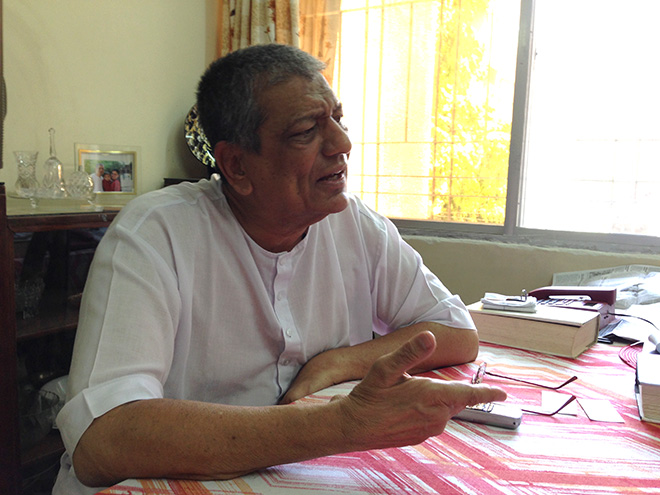
Why did Modi choose Baroda — with 11,539,68 male voters, 10,717,95 female voters and 34 other voters, as per the latest Gujarat census figures — as his constituency?
Professor J S Bandukwala, a human rights activist who narrowly escaped death when rioters burnt down his in 2002, said: “He chose Baroda because this is the most BJP-oriented constituency in Gujarat.”
Because of the RSS impact from its headquarters in central Maharashtra?
“Not only the RSS impact. The impact of people abroad. This is the Patel-Patidar area and every family has someone abroad. There is a very large population in America and they are very fanatical, most of the Patels. This is their centre. They are all settled in New Jersey and other areas. This is the one constituency he doesn’t have to bother about.”
If Modi wins both Varanasi and Baroda, will he step down from the latter constituency? We asked Dangar that, but he refused to answer.
“Our aim is to make a historical victory,” he said.
Modi will most likely triumph in Baroda, but will the industrious 25,000 Page Pramukhs succeed in bringing some of the city’s approximately 300,000 Muslims to vote saffron? Javed, a taxi driver who took us around, thought so.
“The riots took place in 2002. Things have changed since then,” he said. “Modi has found a place in our hearts. He has brought progress. He has provided jobs.”
Bandukwala, who has a daughter and son settled in the US, and a Hindu Gujarati son-in-law, had this to say of Modi:
“Many Muslims have become resigned to him. They will just accept him for whatever he is. Which I can understand. Small people in public cannot say anything, for fear that there may be a reaction.”
He continued, “Muslims are in a real trap just now. There is an intense fear also. If you go below the surface you will find an uneasiness. We don’t know what is going to happen. We don’t know. That fear is very deep. Society is completely communalised and divided. I don’t know where we will be headed.”
Baroda has a scarred history. Though some of the worst incidents of the 2002 Gujarat riots that saw about 1,500 casualties took place 111 km away in Ahmedabad, Baroda too witnessed deaths – some 36 people were killed in the ensuing violence in the city. Its proximity to Godhra also meant that scores of Muslims fled to Baroda. There was more Hindu-Muslim violence in 2006. But is it possible that BJP might have gained some Muslim voters who are willing to put 2002 behind them?
Mistry said, “In the constituency I was representing, I don’t think they have put it behind.”
As we travelled through rural Gujarat the next day, we quizzed Muslim voters about their preference. The much-touted Gujarat model of Narendra Modi seemed to not have percolated these areas; and despite what Dangar claimed, many Muslims among the 1.637 million voters of Baroda were not Modis, but anti-Modis.
Bandukwala’s words seemed to acquire a ring of truth as we left our last interviewee. “Muslims voting for Modi would be very low,” the professor had said. “Those who have joined with Modi have been ostracised in the community.”
A version of this story was first published on Rediff.com, our media partner.
Photographs: Patrick Ward, Vaihayasi P Daniel/Rediff.com
As polling ends, a profile of the men and women who fought for your votes
Female candidates made up just 8% of the field. In the last Lok Sabha women occupied 11% of the seats. This means that in order to beat that figure, female candidates will need to be more electorally successful than their male counterparts this time around.
Most candidates were in their 40s, the average age being 47.
There were 52 candidates aged 25. The constitution states that anyone under the age of 25 may not sit in the Lok Sabha.
At 93 Ram Sundar Das is the oldest candidate — the only one in the 90s, in fact. He is running in Hajipur, Bihar for the Bharatiya Janata Party.
Rishang Keishing, who is 94, currently holds the record for India’s and the world’s oldest MP. However, he is not seeking reelection this time. If Sundar Das is elected and serves a full term he will become the world’s oldest MP.
Just under one-third of the candidates are graduates, and over 40% declared that they are educated to a high school level.
Five per cent of candidates have no formal education.
The average candidate has assets totalling Rs 49,309,000 (approximately £488,000).
The wealthiest candidate is technology entrepreneur Nandan Nilekani, who declared total assets of Rs 77,102,957,219 (approximately £763,473,000), including Rs 1,166,057,978 (£11,546,000) currently deposited in the bank.
The majority of the candidate, 82%, have never been involved in any criminal cases.
Two candidates from the Aam Aadmi Party in Tamil Nadu came top of the list in terms of involvement in criminal cases.
Udayakumar S P declared in his sworn affidavit that he has been involved in 382 cases, which include 19 charges of attempted murder and 16 charges “related to waging, or attempting to wage war, or abetting waging of war, against the Government of India”.
M Pushparayan, came a close second, declaring he has been involved in 380 criminal case.
Data compiled by the Association for Democratic Reforms and National Election Watch, based on sworn affidavits from candidates.
The youth of India have voted, and they have voted for world-class education
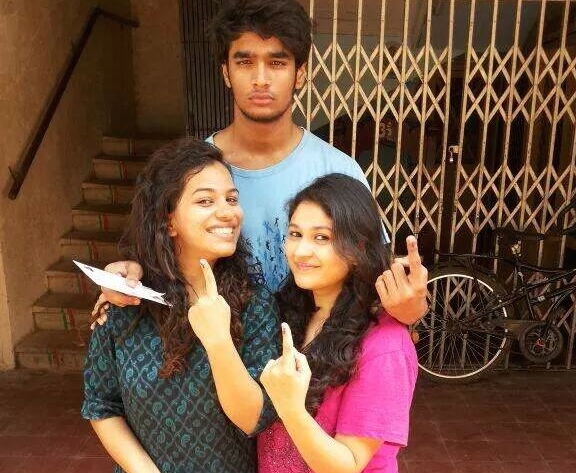 Shishir Samant, a 21-year-old management student of the Lala Lajpatran College of Commerce and Economics, says the only thing that matters to him and his friends is the state of education in the country.
Shishir Samant, a 21-year-old management student of the Lala Lajpatran College of Commerce and Economics, says the only thing that matters to him and his friends is the state of education in the country.
“Economic issues do not influence us at the moment,” he said.
Like many other students, Samant is not happy with the state of affairs in the education sector. His college is affiliated with the Mumbai University and he thinks the government should take responsibility for anomalies in the system.
Supriya Bwivedi, 20, a medical student at the B J Government Medical College, had the same opinion as Shishir. She said: “Some things are been neglected, the funding to run hospitals and medical facilities is not there and the money people get is not equivalent to their work.”
Many others said the lack of infrastructure has made learning difficult; it has made many courses largely theoretical.
Sneha Murchavade, 20, a student of commercial art at Sophia College for Women thinks that with a little more practical classes the colleges in India should be able to compete globally.
Apart from providing the right environment, the students also expect a government that would be willing to review policies.
Proshant Chakraborty, a student of anthropology at St Xavier’s College, says there is too much state control and censorship in education. “Books that are thought provocative by one person are dropped. Education has been politicised, so whoever comes to power controls it,” he said.
Not everyone though thinks the system is as bad or that the system needs to change drastically. Anshuman Preenza, 19, a student of Mechatronics at the University of Petroleum and Energy Studies expressed satisfaction at the pace of progress.
“We are gradually turning to a more practical approach. Exams are now application-based questions. Five years back we didn’t have this amount of logistics. I think things are turning for good,” he said.
He was however quick to distance the government from any of this achievements and think a more proactive government would make things even better.
Koran Hemanp, a medical student at Rural Medical College in Kolkata, thinks that what is needed is dedication from student; tools and infrastructure don’t matter too much if there is no dedication from students. But even he thinks that things have to change. He, for example, finds the common entrance into the medical college unjustified.
Some students though felt that things other than the elections should influence their votes. Pankhil Mispry, 20, a student of the VJPI Engineering College, said: “I thought first about development. I wanted a leader who would give attention to the manufacturing sector, improve the railways and other forms of transportation.”
A majority of students have expressed discontent about the level of education especially its lack of practical classes. Some of this problem have been linked to government policies or , in some cases, inaction.
“I also had education in mind when I was deciding who to vote for. The kind of education that I like takes place only in private institution. Government colleges have the intellectual crowds that are not treated properly. Private institutions have the rich crowd. At the end there is no proper man-power,” Pankhil said.
The students linked the poor state of education to the government and most thought that a new government might make this better.
“I hope for a new government. This present government has had 10 years and has not worked. Nothing will change if they continue,” Sneha said.
Even Ansuman who thinks that the institutions are improving wants a new government. He said: “Change is always better. Let’s see what a new government can do. Let’s give other people a chance.”
Photo: Apekshita Varshney. Student voters in Mumbai
This story also appeared on Rediff.com, our media partner.
As elections near an end, a look at India’s other half
According to the Election Commission of India, the gap between male and female voter turnout has been gradually decreasing since 1962. Female participation in state elections has risen since 2009. The gap could well be set to narrow even further this time around.
Although the official breakdown of voter numbers is yet to be released, the EC disclosed that in Chandigarh, Arunachal Pradesh, Goa, Sikkim and Lakshadweep there were more votes cast by women than by men.
Of the 20 states that have held elections since the last Lok Sabha polls, 16 recorded a higher voting percentage among women than men.
The EC is also hoping that a programme, which includes the deployment of election officials to voters’ homes to encourage women to vote, will help narrow the gap further, after a national survey found that women were often reluctant to visit a polling station unless accompanied by a man.
These official measures have been accompanied by social media campaigns, such as ‘Power of 49’, that have been active in encouraging women to vote.
The ‘Power of 49’ manifesto cites the underrepresentation of women in Parliament as one of the key concerns of their campaign.
Gender Balance in the Lok Sabha
After the 2009 election, female members of the lower house rose above 10% for the first time.
In that election, women were actually more electorally successful than men. Women made up 7% of candidates fielded, with 11% of those candidates taking a seat in the Lok Sabha. This compares to a 6% success rate for male candidates.
In every general election since 1980 female hopefuls have recorded a higher success rate than their male counterparts.
Of the 7,562 candidates who submitted themselves to the electorate so far, just 592 (8%) are women. This 1% increase on last year’s figure suggests that change in this area will be gradual rather than sudden.
Even with the tendency for women candidates to be more successful than their male opponents, anything other than a modest rise in female representation looks unlikely.
Whatever the new Parliament looks like, India’s attitude towards women’s rights and violence against women is set to remain a contentious issue.
The conservative BJP, which is poised to do well in the current poll, point to increase in girls’ education and decreases in female infanticide in BJP-governed Madhya Pradesh as evidence of its commitment to women’s rights.
This commitment, however, has been called into question by critics of the BJP who accuse its leader, Narendra Modi, of paying lip service to the issue of women’s rights. Journalist Ankit Panda, who covers Indian politics for the Diplomat magazine, stated, “It seems to me that a majority of BJP members espouse views that are hostile to the liberal notion of gender equality.”
An open letter in The Guardian newspaper signed by Salman Rushdie, among others, has also drawn attention to the BJP’s record in this regard. Urging electors to “remember the role played by the Modi government in the horrifying events that took place in Gujarat in 2002,” the letter states “Women, in particular, were subjected to brutal acts of violence and were left largely unprotected by the security forces.”
